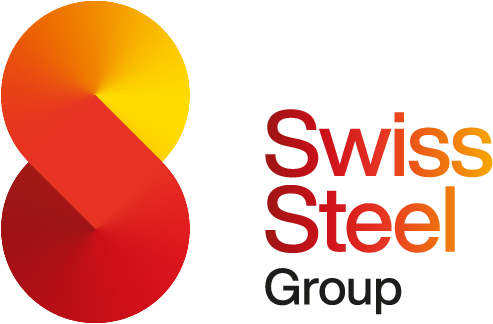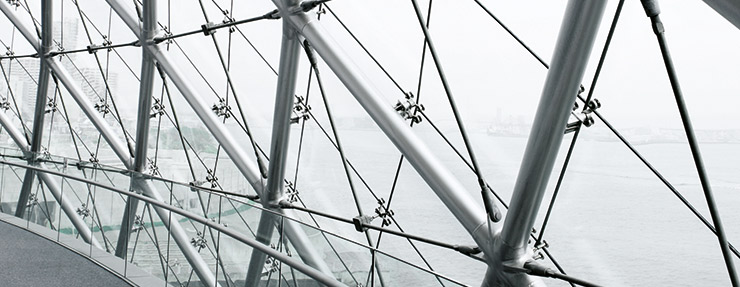Top steel solution for general construction and civil engineering
- Extends the lifetime of engineering works significantly
- Five times more resistant to corrosion
- Approved in Germany by Deutsches Institut für Bautechnik
Corrosion is the enemy of all rebar. It jeopardizes the look and safety of structures and in the worst case can lead to the collapse of the entire construction. The result is generally expensive repairs. In Germany and Switzerland, steel producer Swiss Steel now offers a material known as 1.4003, a cost-efficient solution made of concrete reinforcement steel. Known as Top12-500, the material is up to five times more resistant to corrosion due to chlorides than standard B500B steel and also withstands carbonatation.
This extends the lifetime of engineering works, such as tunnels or bridges, significantly, resulting in lower lifecycle costs. Additional advantages of the steel: building designs can be more intricate and lighter. The material has been generally approved for the German market by Deutsches Institut für Bautechnik [German Institute for Building Technology] for use in construction since September 2016.
In building, what is known as "carbonatation" is a phenomenon feared by experts: the cement block reacts with CO2 in the air, lowering the pH of water in the pores of concrete. This results in surface corrosion on steel rebar. In the medium- to long-term, rust causes concrete to crack and spall - a risk common when the layer of concrete over the rebar is too thin. The aesthetic appearance suffers. In civil and underground engineering, construction experts frequently battle with chlorides penetrating into the concrete of bridges and tunnels due to wheel splatter or water spray.
But constructions built above ground, such as e.g. parking structures are also affected. Chlorides are extremely corrosive, depending on the concentration in which they occur, and cause pitting, or localized corrosion, in rebar. The corrosion attacks the material and reduces the steel cross section. This process is not visible to the eye and poses a major risk for the construction's structural safety. A reduction in the steel cross section reduces the rebar's bearing capacity, and in extreme cases, the entire construction is in danger of collapse.
In the use of conventional rebar, the calculated life of components falls short in many cases depending on the chloride concentration. In this case, building costs are often nowhere near amortization. Moreover, rebar corrosion is frequently the cause of elaborate and costly rehabilitation work. In addition to this additional cost and effort, maintenance costs also rise, particularly in parts of the structure difficult to access. The economic losses triggered by traffic jams, blocked lanes on roads, bridges or in tunnels is enormous.
The recipe for success: Top12-500
The aim is to calculate lifecycle costs ahead of time, during the planning stages of reinforced concrete constructions. In introducing Top12-500, Swiss Steel, a company of the SCHMOLZ + BICKENBACH Group, now offers the optimum steel solution to meet the highest requirements of durability in structural and civil engineering. Top12-500 is a high-alloy stainless steel with material number 1.4003.
Compared to standard reinforced concrete, this special steel from Swiss Steel is one to up to five times more resistant to corrosion due to chlorides. The secret of the outstanding mechanical material properties and the high corrosion resistance is in the steel production process. A decisive factor is the systematic addition of alloys to the steel melt, including more than 12% chromium.
The molten steel is then cast into billets at the continuous casting line. Ribbed rebar is manufactured using a patented rolling process. Swiss Steel produces this rebar directly from the steel billet using a hot rolling process. Once the rolling process is completed, the steel is inspected, systematically cooled, and given it its excellent mechanical properties. To improve corrosion resistance to meet the given requirements, Swiss Steel pickles Top12-500 products after hot rolling - yet another parameter to increase corrosion resistance fivefold.
Pickling removes mill and rolling scale. The bar surface is smoother and more homogenous overall, and the ribbed steel is protected against surface corrosion and pitting. While conventional unalloyed B500B steel reinforcement withstands a chloride content of approx. 0.5 percent by weight in concrete, this value is up to five times higher for Top12-500.
Proven top durability
The most persuasive argument for Top12-500 is its long life when used as concrete and reinforcing steel. A prime example is its use in bridge piers. The service life requirement is around 80 years, but repairs are frequently already needed after just 40 years. As structural components exposed to the elements and important to safety, they are subjected to high loads, weathering as well as splash water and, seasonally, even de-icing salt. To delay the onset of corrosion as long as possible, the layer of concrete over the rebar is usually at least 5 cm thick. The quality of concrete used also plays an important role when it comes to the durability and strength of the component.
Compared to standard reinforcement, Top12-500 is more resistant to corrosion. Thus the equation used to determine the calculated life in civil engineering consists of the following elements: concrete + sufficient reinforcement layer + Top12-500. Taking the example of the bridge pier, it has been determined that users save up to two maintenance intervals when they replace standard reinforcements with the steel product from Swiss Steel. In building construction, the layer of concrete over the rebar can be reduced to a minimum of 10 to 15 mm depending on the exposure class. This allows users to meet higher demands for intricate and aesthetic building designs.
In Switzerland, Swiss Steel has already used Top12-500 in over 1,000 structural and civil engineering projects. With immediate effect, the special product has also been approved for the German market. Three pilot projects have already been completed in Bavaria, two on the A 96 highway in the Etterschlag and Eching tunnels. The requirement as defined by Autobahndirektion Südbayern, the highway authority for southern Bavaria, was to considerably extend the life of the components exposed to high chloride concentrations and not regularly washed clean by rain, for example in bridge parapets and emergency walkways in tunnels.
The chloride content at the walkway reinforcement is consistently more than 1.7 percent by weight, based on a period of less than 20 years. The optimum solution for the highway authority is Top12-500 rebar. It has a higher resistance to chloride than conventional reinforcements given the same design rules. Around 56 t of Top12-500 have been used at the Etterschlag and Eching tunnels since summer 2016 and ensure a long-term intact structural element.
Top12-500 meets the requirements of the standards DIN EN 488, EN 10088, SIA 262 and SIA 2029. Top12-500 rebar is available in Switzerland in diameters of 6 to 20 mm. In Germany, the Deutsches Institut für Bautechnik has approved sizes ranging from 8 to 44 mm.
About Swiss Steel
In the European long steel market, Swiss Steel AG is one of the leading vendors of quality, stainless and free-cutting steel solutions. The company’s core products include 5.5 – 44 mm diameter wire rod as well as 16 – 66 mm diameter bar steel. The range of profiles comprises round steel, hexagon steel as well as profiled steel. Swiss Steel is a centre of excellence for the production of high-quality special steels for the automotive, manufacturing and apparatus engineering industries and has more than 150 years of experience in steel production. Networking throughout the entire value-add chain, Swiss Steel develops stainless steels that meet the precise requirements of processors and finishers, enabling Swiss Steel to contribute to their success in the markets.
About SCHMOLZ + BICKENBACH
The SCHMOLZ + BICKENBACH Group is today one of the world’s leading providers of individual solutions in the special long steel products sector. The Group is among the leading manufacturers of tool steel and non-corrosive long steel on the global market and one of the two largest companies in Europe for alloyed and high-alloyed constructional steel. With around 9,000 employees and in-house production and distribution companies in over 30 countries and on 5 continents, the company guarantees its customers a global supply and customer service, and offers a complete production portfolio as well as sales and services around the world. Customers benefit from the company's technological expertise, consistently high product quality around the world and detailed knowledge of local markets.
Corporate contact
Christian Linden • Swiss Steel
Phone: +41 (0)41 209-5319
E-Mail: clinden(at)swiss-steel.com
Internet: www.swiss-steel.com
Dr. Ulrich Steiner • SCHMOLZ + BICKENBACH
Phone: +41 (0) 41 581-4120
E-Mail: u.steiner(at)schmolz-bickenbach.com
Internet: www.schmolz-bickenbach.com
Media Contact Agency
Hanna Hagedorn • additiv pr GmbH & Co. KG
Pressearbeit für Logistik, Stahl, Industriegüter und IT
Graf-Adolf-Strasse 72 • D-51065 Köln
Phone: +49 (0) 221 964769-45
E-Mail: hh(at)additiv-pr.de • Internet: www.additiv-pr.de

